
Banner courtesy of Mr. Stuff and High~Light Studios
Playing the same people, with eerily similar decks every week gets old. Don't let a budget keep your play group down.
[Don LaFontaine Voice:] Imagine a world where Magic players are all poor, where cards are rarer: where great new cards are a special treat unto the ages. One player will dare to break the mold of individualism and lavish expense, boldly rallying those around him to his side. Store owners beware: he will skip you by and find his needs in trades with friends and, occasionally, cheap singles on the internet. There is little total profit to be made from him for he is The Budget Player!
Coming soon to a play group near you.[/Don LaFontaine Voice]
The word 'budget' in Magic elicits almost as strong, differing, and verbose opinions (as I'm sure I'll greet in the comments) as the word 'casual'. For many readers and players the tag [BUDGET] and names that start as "Budget Blah-Blah etc." are ignored and skipped. "Why waste my time looking at decks using inferior cards or requests to input when the obvious cards to use aren't allowed?" It’s an easy logical trap to fall into, especially if you play any level of tournament Magic on a regular basis. Budgets and tournaments are often, incorrectly, on opposing sides of a coin; shelling out the money for Sarkhan Vol, Tarmogoyf, Mutavault, or even just Wrath of God can be a big deal when the (sometimes mockingly called 'paltry') amount of money to draft every other week is all someone can scrape up.
While many articles that cover Magic go to great pains to stress that a good mana base is absolutely vital to success (and it generally is), rarer cards are better than any other card and you have little hope without them (and they do count for a lot), or that to take budget to tournaments means going rogue (that is to capitalize on the surprise factor to your advantage). All of these are significant factors; however the real core to budget is that to play budget well (to win) you need to construct decks better and play smarter than the average player.
You have the manners of a goat.
Deck construction, in of itself, is a contentious subject (that I intend to cover someday). Suffice it to say here that deck construction is a difficult, imperfect science that even top players disagree on. There are very broad sets of strategies but, with that in mind, constructing your deck in a manner that best benefits your deck's strategy is crucial. Better constructed (and tested) decks will perform better in the long run. No deck likes to whiff upwards of 50% of the time.
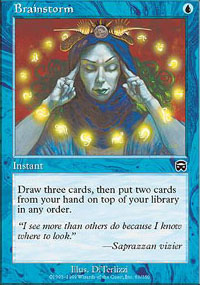
Pro Tip: Do this in real life first.
Obviously it would easy for me to go on and say that "succeeding in this challenge to me makes me a better Magic player than you" but I really can’t: mainly because it’s blatantly untrue, but also because I don't like to intentionally make people angry. I’ve talked about what makes a player a "better Magic player" in terms of the responsibility each player has to the community around themselves. What I am referring to here, in this article, is that by sharpening your observation and analysis and rules skills you can, more frequently than relying on luck alone, pull the rabbit out of the hat.
"Duplication" is the concept of using functional, or near functional, reprints of the same function. Disenchant and Naturalize is not functional reprints: you need different colored mana. However, I would consider Naturalize and Seal of Primordium near functional reprints: they do the same thing to the same mana cost. If want to run 8 copies of Naturalize, 4 copies of Seal of Primordium can work similarly. I'm sure there are even better options available as well.
It’s already been said best.
Understanding yourself and how to best leverage your strengths (and minimize your weaknesses) is very important. But what about the other players you will run in to? How will they react to "I'm going to play my budget weenie deck; do you have something comparable?" Most players will go "Sure!" and gleefully grab the pet jank deck they love to fiddle with. Decks that lose a lot are often the most fun to play against each other. Often, neither deck can gainfully break the others strategy and you get to see weird, comical, and (arguably) fun interactions.
However not every player will react well to the words "budget" or "mostly commons" in reference to the deck they should be ready to play against. The archetypes of bad players that Anthony Alongi presents for multiplayer fit well for my purposes here. Every player has a general style that they play and, therefore, have general foils that work well against them (or at least give you a few more options). Let’s look over the multiplayer player archetypes and generalize them towards duels:

"I have know what you're up to..."
Overreacting Orangutan – "What are you doing and why?"
When you go to win games you’re going to, eventually, make plays that wreck someone else. When you’re on a budget the cards that steer people clear of you for a counterattack, the ultimate Rattlesnake cards like Pernicious Deed, are generally far too pricey. Budget players can, and do, look to cheap Spider-like interactions to deflect the pressure and weaken an opponent; consider Banishing Knack and the first thought many have is 'Blue combat trick' or 'jank common' but really it's an unusual Spider card: team it up with Horseshoe Crab, Puresight Merrow, or Silkbind Faerie and you can really open a game up into a new direction (by wrecking an opponent's board). Budget (cheap) rares like Inundate (and Radiate in multiplayer) can be very powerful and unexpected, especially if you make a cheap deck using a color you usually don't play – surprise and throwing a changeup is how many games are won.Whining Willy – "Not again!? Augh!"
Somebody will always complain: there is a somewhat famous quote somewhere on the internet (by this individual) that goes something along the lines of "If Wizards put $100 bills into packs people would complain how they were folded." The best part about playing budget is that, generally speaking, you can counter any "your cards are broken/rare/expensive" by pointing out that they are cheaper commons/uncommons/rares. Of course some will persist in antagonizing by declaring that a synergy is "broken" because it’s all common (which begs the question: "There's a rule that commons must be designed to suck outside Limited?"). It is safe to say that except for triple Eventide drafting, no player, honestly, calls the mimic cycle broken. The only option left, outside of ignoring said player, is to encourage more, hopefully better, playing and that shuffling does yield random (sometimes abysmal or 'god-hand') draws. Someone can’t be unlucky all the time and if your decks loses every time it’s not luck: your deck is just really bad.Apathetic Attitude – "Screw this. I don't even care man!"
There can be situations where quitting a game is exercising control over a situation, especially in some situations where a player who leaves the game at the right moment gives an enormous advantage to one of the remaining players. Aside from hotly contested casual and multiplayer ethics it should go without saying that you should never stay in a game where you are being verbally abused, physically threatened, or otherwise put into real danger!
Mosquito-Blasting Bazooka Man – "I will crush you!" ("Hulk SMASH!")
There are a few flavors of this player we’ve run into: combo-crushing Spike/Johnny that always has a keen combo deck to go off with, the Spike/Dave that loves to humiliate and mock players whose decks can’t keep up, and the Timmy/Spike that will spam fantastic (and expensive) creatures and spells to blow a newbie out of the water. With these players you really only have one choice: fight fire with fire. Since you’re on a budget, check out the Peasant format (see details in the description below). There are incredible decks that exist in such tight (and pretty inexpensive!) construction restrictions that you can find the deck that beats their strategy… at a fraction of the cost. Will you win every game? No, but you’ll drive your budget deck home just enough to gain the satisfaction of victory over the "more so unfair" decks some players will insist on carrying.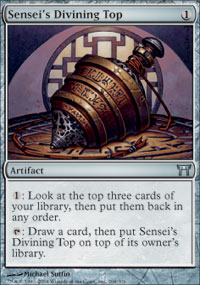
Well in response to your top,
I'll just gouge my eyes out.
Over-Stiff Ego – "If I only had drawn/played/tried/etc..."
After losing a game some players reveal their hands and the next few cards on top of their library to see if they "could" have won. Sometimes it’s neat to see how close a game actually was and how a single top deck can turn game around but to invalidate or marginalize someone's honest win is outright disrespectful. As a budget player you will be harangued, at one point or another, to "get better cards" or that "you won only because I didn’t draw my better cards." Here’s the catch: you did win (Why yes I am stating the facts like a spike). If you won with your Blue/Red "random jank" deck then you've every right to point that out in response (tactfully and graciously; being a jerk can be a two-way street), but if you’re running net-decked Peasant/Pauper deck or a tuned deck from some other competitive budget format decks you might want to reconsider your position. Dominating decks can come in every size, color, style... and rarity – don't gain your own over-stiff ego because you play on a budget. Gracious winners and fun games need each player involved to succeed.Over-Ownership – "I wanted to have that countered: now you have one less counter!"
When you are mocked by someone telling you that something bad to their position is, actually, good for them it can be very easy to become angry (and surprised on the rare event it's true). Fortunately few people can say, either honestly or with a straight face, that they truly enjoy getting repeatedly kicked around by a wacky budget deck (or even a tuned budget deck for that matter). I like the statement "I don’t think that’s going to be very helpful for you in the end." as a way to diffusing their smarmy smirk. Don't accept their efforts to spin the situation or "psych you out" simply at face value; focus more on the goal all great players have: winning (Now I truly sound like a spike).Center-of-the-Universe Syndrome: "Hey, watch me do this!"
As referenced above, combo decks can be decidedly un-fun. There are combos from straight commons and uncommons that are a blast to play… but terrible to watch (see High Tide/Brain Freeze.dec). Some, and by some I mean a majority of, combos are very intricate and time consuming to play out. Players who do this to you and any other player on a regular basis should be avoided: once a player starts playing with combo it can be an addiction from which they never recover. I, myself, belong to 'Combo Addicts Anonymous' (a not-real-as-of-yet group to my knowledge but bear with me here): I want to win with both style and consistency when I play combo. The result is that I generally strip down a combo to a neat interaction and run with that instead. Gimping your own deck is just one way to avoid being the combo-junky: alternatively your combo may be quick, interesting, and engaging. Just as you look to avoid the crushing misery of a face full of annoying combo don’t go and inflict that same misery on those who you ask for fun!Proofread your decks.
The human element to Magic is ever-present: Magic, so long as it survives in the current form it has always been, will be a social game. Some of the player types we’ve looked at are extremely negative reactions to budget Magic. Most reactions will be positive. Why? - let's look at a vague, but generally agreeable, definition of budget in the Magic context:
Budget is limiting yourself to using and/or purchasing cards that, in your perspective, are inexpensive to trade for or buy.
This is the dark, blatant truth to budget: you are a "have not" in Magic. Now "have not" can cover a wide selection of interpretations. What is a "budget card" is to me (the aforementioned Inundate for example) may not be budget for you ("Hey, Inundate is a rare! Geez!"). Moreover, there is no great, definitive consensus on what "budget" means despite anything anyone might say (except me, I'm right). As I state above it is generally agreed that commons are budget, but when you start to look at cards like Rancor, Armadillo Cloak, and older cards you see that commons can get what some would consider pricey in short order. Some commons, like High Tide, Hymn to Tourach, and Echoing Truth are in solid demand as new players discover the power and potential of these cards. While Echoing Truth can still be found for $0.25 US in many places, I have seen as high as $0.50 US when other commons, from the same set, run only $0.05 US. And Echoing Truth is cheap compared to many other commons.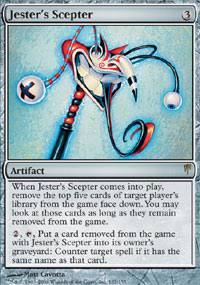
Budget rares can be fun and powerful.
Ultimately, what budget Magic is depends upon your perspective, circumstances, and investment level – all things that players commonly disagree on. Creating agreement can be a great things and, as I've hinted at previously, some special formats can do just that.
Peasant Magic and the Pauper Deck Challenge provide clearly competitive opportunities to restrict your deck to mostly, or exclusively, common cards (Bonus: For the wacky Un-lovers out there Peasant is encouraged be open to even the land of sliver-bordered awesome!). Whether you have random donated cards from across all of Magic or you have a play set of every common and uncommon for just Standard, these formats feed both the budget conscious and Spike types in your group – a good call for groups with diversity.
Reject Rare Draft is a great way to take the jank rares and oddball crazy spells (of the rare variety) and swap them around. With no additional investment your entire play group can play some very strange Limited games by drafting, redrafting, and changing up the rares you use every time. For a special variety try a "Reject Foil Draft" with the foil versions of any rarity of jank.
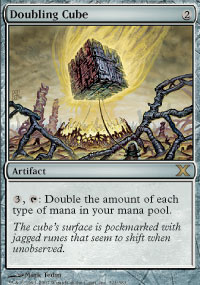
Often doubles your fun too!
Walk a mile in the shoes of someone else.
So where do we go from here? We've looked at many ways to define and support Magic on a budget. Unfortunately as a budget player you will, eventually, run into "the wall" where you can’t get the cards you want (or "need") for a deck because of the expense involved. A commons box or junk rares bin can yield some exciting treats but that isn't how stores make money: they have already long lost the money the store put into the cheapo bulk you dutifully pick through every other week. There is a way to compromise with the store.
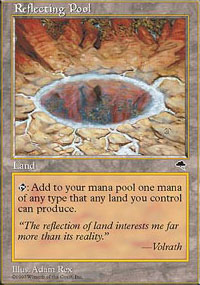
If you had only known two years ago.
Pool your resources and loosen your trades.
Stores love when you buy stuff and, honestly, would love everyone to buy stuff as often as possible. That's how stores makes profit. The problem many budget have with buying stuff at the store isn't that they don't like the store (and if you don’t like the store then don't come back to it!) or want the store to somehow fail (it's a great place to meet friends and play Magic!) but that they see prices of singles, packs, boxes, supplies, and everything else for that matter, all over the internet for significantly less even after accounting for shipping. The very real, and understandable, temptation to buy everything (meaning anything) online can contribute directly to poorer store quality, reduced store hours and accessibility for use, and can even stores closing (a very dramatic and unfortunate event to be sure). Stores often serve as a centering point for a varied community of game players of all genres and styles and losing this center for the community is often devastating.
Store support is a contentious issue among many budget players. Buying bulk commons and cheap rares may seem like a good thing for the store ("I'm buying stuff!") and it often can be but it takes significant time and the limited resources of the store staff to keep it ready for you (even if most of us did pick and sort things neatly; many clearly don't). Since the profit margin is so low (and often non-existent) on bulk bins there is often little time that can be gainfully devoted by the store to maintain this when other, more profitable, things can be done (like setting up card sleeve and deck box displays). Budget players don't like (and often can't) shell out for packs every week, every single card when it is needed, and all the supplies and accessories they would want to protect their precious investment with – budget is budget and you need the most for your money.
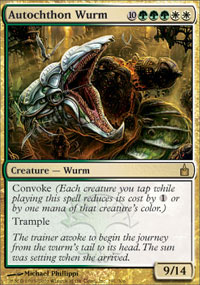
Many small individuals can work to
generate something very big.
Trading away the only copy of Fact or Fiction or Condemn can be hard to swallow: you may want it someday. The realistic question you have to answer is "How soon will I actually want this card?" It is extraordinarily tempting to keep all of your "good stuff" cards especially when they are initially hard to come by. I am simply suggesting that by trading some of the "good stuff" in demand that you aren't going to use you can get more of the "good stuff" that you will use.
"Good stuff" is vaguely defined as cards that, while not the chare rares and game breaking overpoweredness (if that’s even a word), they are the cards you can always use. They feel at home in a wide variety of decks, providing degrees of consistency and power. Of course "good stuff" is an opinion but some examples that many would agree to are Brainstorm/Ponder, Flametongue Kavu/Lightning Bolt, White Knight/Swords to Plowshares, Hideous Laughter/Infest, and Harmonize/Sakura-Tribe Elder – all great cards that fit as a solid choice in plenty of decks.
Change: it's all you’ll have left when you're done.
However you choose to look at, approach, or work under budget Magic you’ll find plenty of opportunities to advance great decks, challenge others perceptions and views, and perhaps even invigorate your local play group to try some new ideas that benefit your local store. Varying decks, especially within the same color, is very difficult for some players, budget variety or not. Being not just capable but willing to change up your deck, strategy, style, theme, colors, and even win conditions from week to week can be both exciting and tiresome. Consolidating to a format allows a diversity of decks to be made and flourish is vital to any budget-minded player. Accepting that you cannot truly compete in Vintage, Legacy, Extended, Standard, and Block, with Peasant/Pauper and non-Peasant/Pauper varieties of decks you can build is an enormous challenge. It takes humility to accept that, sometimes, without the powerful format-defining cards you simply can't win consistently.
But it is also entirely up to you to discover just how far you can go anyway.
Comments